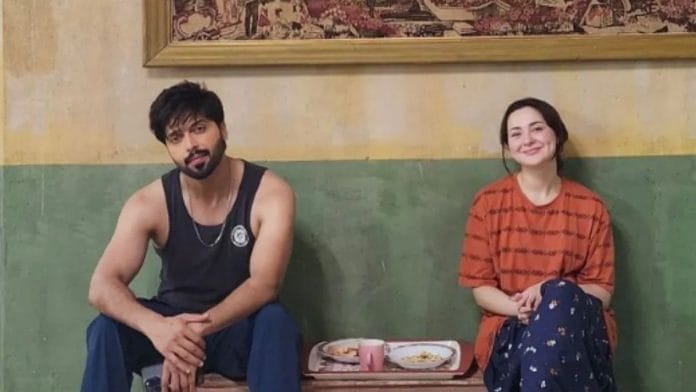New Delhi: Pakistani TV shows are becoming bigger and grander—they are now filling cinema halls across the country. The finale of the latest television sensation Kabhi Main Kabhi Tum, which aired on the small screen Tuesday—alongside sold-out shows on the big screen in Karachi, Lahore, Islamabad, and Faisalabad—proves that the crossover between television and cinema is the next big thing in Pakistan’s entertainment industry.
Theatres ran at full capacity, with showtimes extended late into the night to accommodate the high demand.
Since its premiere in July, Kabhi Main Kabhi Tum, a 34-episode drama starring Fahad Mustafa and Hania Aamir, has been consistently hailed not just in Pakistan, but also in India and Bangladesh, for its relatable storytelling, strong performances, and the powerful chemistry between the lead couple. Many social media users in Pakistan have called KMKT one of the best TV shows ever. Written by Farhat Ishtiaq and directed by Badar Mehmood, the show follows the journey of Mustafa and Sharjeena as they navigate life as a couple in Karachi.
The trend of airing TV drama finales in cinemas isn’t entirely new, but KMKT’s theatrical success clearly signals a shift in how television content is being consumed and marketed in Pakistan. The 2019 cinematic release of the finale episode of Humayun Saeed’s Meray Paas Tum Ho was no aberration. Moreover, capitalising on public interest in a particular show also works out for cinema owners, who struggle to fill seats even on weekends.
“Television has a huge pull, and once-in-a-blue-moon, a blockbuster drama’s climax or premiere makes it to the cinemas, because the networks feel that the audience demand is high, and it will be a great publicity event. Given the low footfalls in cinemas of late, there’s nothing wrong with a television event making its way to cinemas. If people show up to buy tickets — and there is a niche fanbase that does, at least for the weekend — then that’s a bonus,” film critic Kamran Jawaid told ThePrint.
Also read: Ratan Tata had a disco link with Pakistan. He made Zoheb & Nazia Hassan global superstars
Fad or future of Pakistan TV?
For directors and producers, the move to cinema isn’t just about catering to fan demand—it’s also an effective publicity strategy. The cinematic release creates a major event, building anticipation and generating conversation around the drama. It gives the show a sense of grandeur, and the cross-promotion between television and cinema boosts visibility. For cinema owners, it’s a rare opportunity to fill seats, especially on weekdays when ticket sales typically lag.
“The trend picked up with Humayun Saeed’s Meray Paas Tum Ho’s climatic episode — now that was a blockbuster in the true sense of the word, both on television and cinemas, then there was the Bilal Abbas starrer Ishq Murshid’s final episode, before that, a “cinema-cut” of the first episode of Atif Aslam led Sang-e-Mah, and then the premiere of Humayun Saeed’s Gentleman. Kabhi Main Kabhi Tum’s final episode is but an addition to the trend,” Jawaid added.
Pakistani producer Nadeem Mandviwalla agreed and said that Meray Paas Tum Ho popularised this trend of theatre screenings. The drama’s final episode collected a remarkable Rs 3.5 crore in a single day, Mandviwalla said.
“It’s the popularity of the drama which leads to this. While it doesn’t happen often, sometimes the drama becomes such a big hit that the finale is shown in cinemas and becomes a great success while it remains only for a day’s business. After Meray Pas Tum Ho, a few have tried but not catered to that kind of success. In KMKT’s case, the attendance was 100% at 8 pm across all screens where it was playing, which made it a profitable venture,” he added.
Even Indian social media users agree. The show united fans across the subcontinent. One Indian X user wrote, “A. The grand finale of Kabhi Main Kabhi Tum was showcased in cinemas in Pakistan. No Indian serial has ever reached this kind of popularity. B. I have not rooted for any love story in a long time like I did for Sharjeena and Mustafa!” While another said, “Finally, one of the rare Pakistani shows that ended beautifully. Pakistani shows are better, but they fumble at the end. ‘KMKT’ was an exception.”






